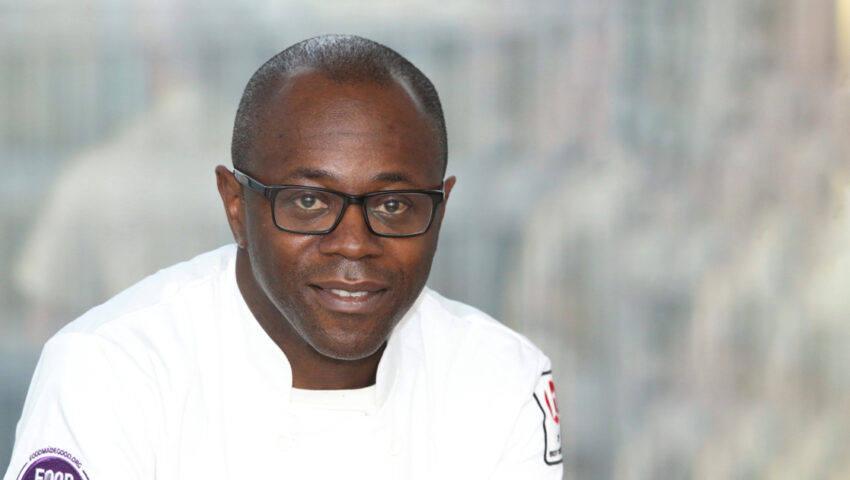Blogs
Becoming a Head Chef

Tell us about your career. How did you become a head chef?
I started my career by studying electronics and communication at the Merchant Navy college in Greenhithe! When I qualified in 1998 there was a recession, so companies like Marconi and Siemens were not recruiting. I had been working part-time in a West End restaurant to support myself through college. Even though I was considering doing a degree at Kings College University I realised that I actually preferred cooking in the kitchen so I started working full time in restaurants.
I did a stint at the Embassy with John Burton-Race and set up various restaurants. But when my first son was born, I found myself working 60 to 70-hour weeks. My work-life balance was non-existent, so I made the move into contract catering in 2005. I joined Admiral and a lovely lady called Julie took me under her wing. In those days I worked mainly in fine dining. I started working at Roux Fine Dining for an investment bank and I loved it, we mainly cooked à la carte. We worked really hard and it was challenging but I loved their philosophy. It was about simple food, good ingredients and great cooking and never over-garnishing. I came to realise that head chefs could be responsible for hospitality and restaurants food. I then made a big step into one of the world’s most famous independent investment banks. It is in large part due to our company’s executive chef. He gave me a chance and encouraged me. He pushed me and said, “come on you can do this!” I was worried about whether I would fit in? He told me to forget about that nonsense, that I was a great chef and could do the job. He helped me to believe in myself. That was a turning point.
How long have you been at bartlett mitchell?
I joined bartlett mitchell in February 2019. I hadn’t realised how big the company was and what nice contracts they had. I had heard good things about the company – it is somewhere you count as an individual and you aren’t just a person. The company cares about you.
You have recently been appointed as Head chef at a prestigious law firm. What is a typical day for you?
In this new Covid world there are no typical days anymore! Every day is unique.
Your client is supporting Black History Month. What are you doing on site?
We have planned an adventurous menu, such as one celebrating Nigerian Independence Day. We have developed dishes from the southern states of America, Caribbean street-food, and the ever popular peri peri chicken (which believe it or not has its origins in Mozambique) and Brazilian Feijoada with Portuguese influences. We are covering the whole world and not just food from the obvious places. Like this tasty recipe from Nigeria
What does Black History Month mean to you?
When I was younger black history month didn’t exist in this country. But it’s important for my kids that they learn about our history in a different way. It shines a light on the contributions black people have made to society. Throughout British history there are black ties as far back as Roman and Tudor times. I recently learnt that John Blanke a Black trumpeter, was a regular musician at the courts of both Henry VII and Henry VIII. He wasn’t a slave. And Jacques Francis, a guinea-born diver was the first person to dive under the Mary Rose after she sank in 1545. Francis would later go on to become the first person of colour to give evidence in an English court.
Why do you think it’s important to learn about black history?
Black history is not just about the Windrush generation or slavery, it’s about the contributions that black people make small and large. They are varied and intrinsically tied up with Britain’s history.
How do you celebrate your heritage?
I just live it! I am from a very multi-cultural family. Our family is part French, Caribbean and African. We are a mish-mash of cultures and we live our heritage through our food and in our music. For example, at Christmas time we eat food from all over the world.
If you could have dinner with someone who pioneered equality, who would it be, why and what would you ask them?
Martin Luther King – it may seem an obvious choice, but it’s not for obvious reasons. I’m curious and fascinated about how he was able to go down the route of non-violence. He embraced everyone, there was no anger within him. He had so much self-control with all the danger and provocation around him, yet he still maintained his dignity. He astounds me and I would ask him how did he manage to do that? It’s hard to keep your cool, we all get provoked at times and it’s easy to get angry. I feel he was very courageous to be able to succeed in maintaining his cool and be a strong leader of people.
What advice would you give to colleagues with a BAME heritage who want to succeed in the hospitality industry?
Equality of opportunity in hospitality has evolved in my working life. When I started there might only have been one or two people with my background in the room. Now it’s all nations. What we all have in common is that we have worked our way up to head chef.
Find a sponsor, apply for a job, get more training and let your manager know you want to progress. Don’t settle for where you are at. Be diligent, put the work in. Unlike other sectors, hard work counts in this industry more so than it does in others.
What advice do you have for our industry to encourage diversity?
Our industry is better obviously than it was 20 years ago. But I still say stick your neck out. I was a sous chef for a very long time and I used to say “always the bridesmaid, never the bride!” So, for me to become head chef, using the example I gave earlier of Rob, my informal sponsor and company exec chef – encourage people to fulfil their potential by offering opportunities to take on more responsibility. Give people a chance to impress you, and don’t underestimate the importance of those quiet encouraging words!





